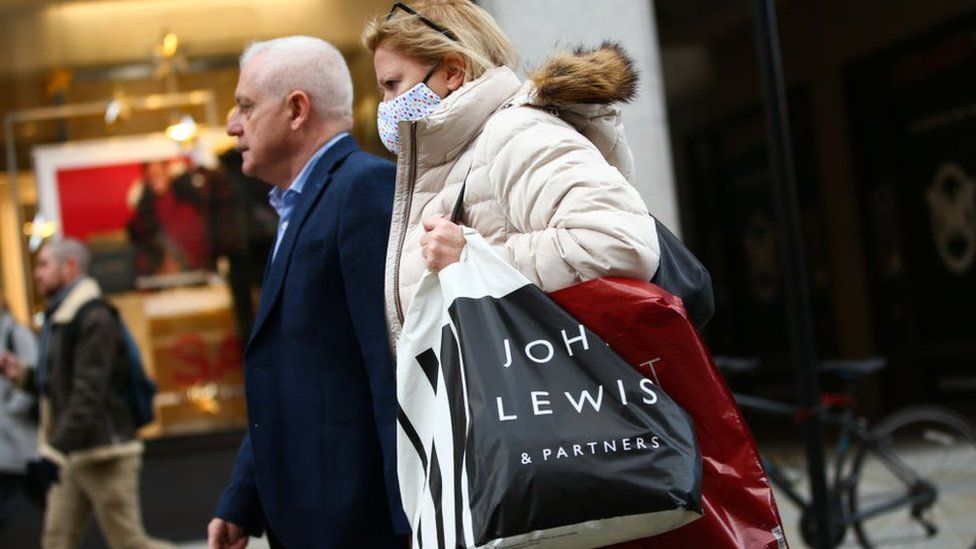Retail giant John Lewis has warned of further "painful" store closures after the pandemic saw it report its first ever annual loss.
The group swung to a loss of £517m for the year to January, against profits of £146m the previous year.
The retailer said it "does not expect" all of its department stores to reopen once lockdown restrictions ease.
It has previously been reported the chain was considering closing up to eight more stores to try to cut costs.
Any further closures would be in addition to eight already announced in 2020.
It did not say how many of its 42 John Lewis shops were under threat but said it was a "small number". Talks with landlords are ongoing and it will make a final decision at the end of March.
The rise in internet shopping, accelerated by various lockdown measures amid the coronavirus pandemic, has forced John Lewis to rethink how many stores it needs.
John Lewis said that before the pandemic, it judged that every £6 in £10 spent on its websites was driven by its shops. That figure is now just £3 in £10, it said.

Chairman Sharon White told the BBC that the decision to close stores was "painful" but necessary due to a "decade of changes in shopping habits in one year".
"There is no getting away from the fact that some areas can no longer profitably sustain a John Lewis store," she added in a statement.
"Regrettably, we do not expect to reopen all our John Lewis shops at the end of lockdown, which will also have implications for our supply chain.
"We will do everything we can to lessen the impact and will continue to provide community funds to support local areas.
"We want to ensure our stores reflect how customers want to shop - 'right space, right place'."

Reinvention for the digital age

Sharon White landed in the driving seat just weeks before the pandemic and swiftly had to make some tough decisions - closing stores, slashing jobs and cutting costs. She also had to tell partners that for the first time in more than 50 years they wouldn't receive their much cherished annual bonus.
These past 12 months have clearly focused minds on how many big department stores it needs.
Despite lockdown restrictions, John Lewis sales were flat last year. In other words, it managed to transfer all those lost sales from the High Street to online. Its website business was already strong and it predicts 70% of sales will be online from 2025.
But another raft of store closures is a real blow for the towns they're based in. Some will think it's going too far - that there could be an opportunity for it to add sales, given that so many of its rivals have either beaten a retreat or disappeared altogether.
John Lewis went on a big expansion spree back in 2007, almost doubling the number of stores in its portfolio. As sad as it is, it's now set to rein those numbers in as Sharon White tries to rebalance her store estate and reinvent the business for the digital age.

John Lewis' hefty annual loss was mainly due to the write down in the value of its stores because of the shift to online shopping, as well as restructuring and redundancy costs.
The group announced last July it was closing John Lewis stores in Birmingham, Croydon, Watford, Newbury, Swindon and Tamworth, as well as the smaller hubs at St Pancras and Heathrow, with the loss of 1,300 jobs.
In September, John Lewis also announced it was scrapping its staff bonus for the first time since 1953 in September.
The partnership, which also runs Waitrose supermarkets, is now targeting savings of £300m a year by 2022.
In addition to closing some John Lewis stores, the group is trialling running dedicated John Lewis shopping areas in some Waitrose supermarkets.
Waitrose benefitted from a jump in demand for online deliveries as people sought to minimise trips to the supermarket. John Lewis said the Waitrose website was taking about 240,000 orders a week, and now "stands as a £1bn sales business".
Rates relief
The increased demand for groceries, however, did not offset the problems at the group's department stores.
As a result, John Lewis confirmed that it would not return the business rates relief it has received from government during the Covid crisis.
It said it had claimed £190m in combined rates relief and support under the furlough scheme, and that it would claim business rates relief between April and June.
It said the holiday from the tax levied on non-domestic properties had helped it avoid "a more severe restructuring of the partnership, which would have put more jobs at risk at a time when the High Street is already under pressure".
"We are not out of the crisis yet and the economic environment remains extremely uncertain," it added.
Grocers such as Morrisons, Tesco and Asda said in December that they would return more than £1.7bn in rates relief. This came after supermarkets, whose sales have boomed in the crisis, were criticised for taking government help while paying dividends to shareholders.

Are you a John Lewis employee? Share your experiences by emailing haveyoursay@bbc.co.uk.
Please include a contact number if you are willing to speak to a BBC journalist. You can also get in touch in the following ways:
- WhatsApp: +44 7756 165803
- Tweet: @BBC_HaveYourSay
- Upload pictures or video
- Please read our terms & conditions and privacy policy
If you are reading this page and can't see the form you will need to visit the mobile version of the BBC website to submit your question or comment or you can email us at HaveYourSay@bbc.co.uk. Please include your name, age and location with any submission.
https://news.google.com/__i/rss/rd/articles/CBMiLGh0dHBzOi8vd3d3LmJiYy5jby51ay9uZXdzL2J1c2luZXNzLTU2MzU3NDEy0gEwaHR0cHM6Ly93d3cuYmJjLmNvLnVrL25ld3MvYW1wL2J1c2luZXNzLTU2MzU3NDEy?oc=5
2021-03-11 11:28:02Z
52781428927081
Tidak ada komentar:
Posting Komentar